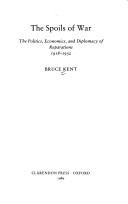Clarendon Paperbacks
1 total work
This is an account of the dispute over which country should "pay" for World War I - a dispute which poisoned international relations, destabilized the world's financial markets and encouraged the rise of the Nazis in the 1920s and 1930s. The author analyzes the origins and persistence of the financial demands made upon Germany following World War I. He argues that the victors had no coherent policy of eliminating Germany as a commercial or strategic threat and that the indemnity illusion was fostered by British, French and American statesmen to conceal the financial implications of the war and to defuse radical agitation for heavy taxation. He emphasizes the role of pressure from the financial elite in the collapse of the Weimar Republic and the political motivation behind the violent post-war inflation and deflation.
